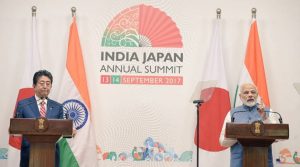 Janjivan Bureau / Gandhinagar: Strongly pitching for a “zero- tolerance” approach towards terrorism, India and Japan today agreed to strengthen cooperation against terror groups like Al-Qaida and Pakistan-based Jaish-e-Mohammed (JeM) and Lashkar-e-Taiba (LeT).
Janjivan Bureau / Gandhinagar: Strongly pitching for a “zero- tolerance” approach towards terrorism, India and Japan today agreed to strengthen cooperation against terror groups like Al-Qaida and Pakistan-based Jaish-e-Mohammed (JeM) and Lashkar-e-Taiba (LeT).
Prime Minister Narendra Modi and his Japanese counterpart Shinzo Abe asked Islamabad to bring to book the perpetrators of terror strikes, including those involved in the Mumbai (2008) and Pathankot (2016) attacks, according to a joint statement issued after their annual summit.
The two leaders also condemned in the “strongest terms” the growing menace of terrorism and violent extremism, it said.
“They shared the view that terrorism in all its forms and manifestations is a global scourge that must be forcefully combated through concerted global action in the spirit of ‘zero tolerance’,” the document said.
The two prime ministers called upon all countries to work towards rooting out terrorist safe havens and infrastructure, disrupting terrorist networks and financing channels and halting cross-border movement of terrorists, in an apparent reference to Pakistan.
“They looked forward to the convening of the fifth Japan-India Consultation on Terrorism and to strengthening cooperation against terrorist threats from groups, including Al-Qaida, ISIS, JeM, LeT and their affiliates,” the statement added.
Modi and Abe called upon all UN member countries to implement UNSC resolution 1267 and other relevant resolutions dealing with the designation of terrorist entities, the statement said.
Read full list of agreements signed between India and Japan:
1. MOC between the Ministry of Home Affairs of the Government of the Republic of India and the Cabinet Office of the Government of Japan aims to cooperate and collaborate in the field of disaster risk reduction and to share the experiences, knowledge and policies on disaster prevention.
2. MoC in the field of Japanese language education in India between MEA and MOFA, Japan, to further strengthen bilateral relations and cooperation in the field of Japanese language education in India.
3. The India Japan Act East Forum to enhance connectivity and promote developmental projects in the northeastern region of India in an efficient and effective manner.
4. Arrangement between India Post and Japan Post on administrative instruction for the implementation of cool EMS service aims at implementing the commercial arrangement of ‘Cool EMS’ service between Japan Post and India Post, through which fresh food can be sent from Japan to India in cool boxes for the Japanese expatriates in India.
5. The India-Japan Investment Promotion Road map between DIPP and METI to facilitate and accelerate Japanese investments in India.
6. MoC between METI and the state of Gujarat on ‘Japan-India special programme for Make In India’ in Mandal Bechraj-Khoraj, to cooperate in infrastructure development programmes in the Mandal Bechraj-Khorajregion.
7. Exchange of RoD on Civil Aviation Cooperation, which opens skies between India and Japan i.e. Indian and Japanese carriers can mount now unlimited flights to select cities.
8. Agreement for international joint exchange programme between inter-disciplinary theoretical and mathematical sciences programme (iTHEMS), RIKEN and National Centres for Biological Sciences (Simons-NCBS) to establish a ‘Joint Exchange Programme’ to identify and foster talented young scientists from both countries to collaborate in the field of theoretical biology.
9. Joint research contract between the National Institute of Advanced Industrial Science & Technology (AIST), Japan, and the Department of Biotechnology (DBT) to conduct joint research and to establish an international centre named ‘DBT-AIST International CENter for Translational & Environmental Research (DAICENTER)’ at AIST, Japan, in order to promote science and technology in both.
10. MoU signed between DBT and National Institute of Advanced Science & Technology (AIST), to promote research collaboration between DBT research institutes and AIST in the fields of life sciences and biotechnology.
11. MoU signed on international academic and sports exchange between Lakshmibai National Institute of Physical Education (LNIPE)and Nippon Sports Science University, Japan (NSSU). This will facilitate and deepen international education cooperation and exchanges between Lakshmibai National Institute of Physical Education, India, and Nippon Sport Science University, Japan.
12. MoU signed on international academic and sports exchange between the Sports Authority of India and Nippon Sports Science University, Japan (NSSU). This will facilitate and deepen international education cooperation and exchange between the Sports Authority of India and Nippon Sport Science University, Japan.
13. Letter of intent signed between Lakshmibai National Institute of Physical Education (LNIPE) and the University of Tsukuba, Japan to strengthen strategic collaboration, joint research programmes and exchanges between the Lakshmibai National Institute of Physical Education, India and University of Tsukuba, Japan will be undertaken.
14. Letter of intent signed between Sports Authority of India and University of Tsukuba, Japan to strengthen strategic collaboration, joint research programme and exchanges between University of Tsukuba, Japan and Sports Authority of India.
15. MoU signed between RIS and IDE-JETRO for promotion of cooperation in research-related activities to promote institutional cooperation between RIS and IDE-JETRO to strengthen the capacity of research and effectiveness of dissemination of research findings.

















